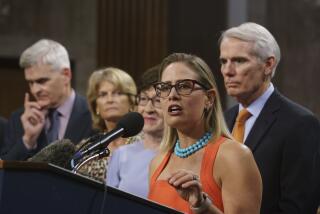Senate Panel Grants $3 Billion in New Tax Breaks for Business
- Share via
WASHINGTON — The Senate Finance Committee, pedaling backward in its movement toward fashioning a tax overhaul proposal, granted another $3 billion in special tax breaks to business Monday.
Sen. Bob Packwood (R-Ore.), the chairman of the committee, expressed clear disappointment with specific actions by the panel for the first time since it took up tax reform. He said that the committee would be forced to “revisit” many of its decisions to avoid producing a bill that would dramatically widen the federal budget deficit.
$14 Billion Less Revenue
When added to previous decisions, the amendments approved Monday to help oil refinery owners, manufacturing firms and Western farmers who own irrigation equipment would reduce revenues by about $14 billion over a five-year period. A like amount of income or reduced expenditures would have to be found to keep the bill revenue neutral.
Panel members said that dozens of other revenue-losing measures are likely to be adopted by the panel over the next few weeks.
“Lose a billion today, a billion tomorrow,” Sen. Bill Bradley (D-N.J.) said. “We’re seeing a continued bleeding of the bill.”
The committee approved an amendment offered by Sen. David L. Boren (D-Okla.) to give more generous tax treatment to oil refineries by allowing their owners to write off their investments twice as quickly as Packwood had originally proposed. The measure would cost an estimated $900 million over five years.
Exception for Farmers
Despite vigorous opposition from Treasury officials, the panel accepted also a proposal by Sen. Steven D. Symms (R-Ida.), costing $50 million, to grant a special exception to farmers with irrigation equipment who sell their property.
Just before breaking for the day, the committee approved a proposal by Sen. Charles E. Grassley (R-Iowa) that would protect certain existing business equipment from changes in inventory accounting rules designed to measure real income more accurately. The proposal would cost an estimated $1.9 billion over five years.
It easily could have been more. The panel had rejected an earlier Grassley proposal on inventories that would have lost $5 billion only after Packwood warned: “If this one passes, we’ve opened the dam.”
Two Proposals Rejected
By contrast, the panel rejected two proposals that would have narrowed tax preferences and raised revenues to allow lower tax rates.
The committee defeated an amendment by Sen. John H. Chafee (R-R.I.) that would have raised about $1 billion over five years by limiting the use of so-called “builder bonds” for home builders. In an unsuccessful challenge to Packwood’s strong support for employee fringe benefits, Chafee lost also on a proposal that would have eliminated the tax exclusion on the cost of employer-financed life insurance policies of less than $50,000, raising $10 billion over five years.
More to Read
Get the L.A. Times Politics newsletter
Deeply reported insights into legislation, politics and policy from Sacramento, Washington and beyond. In your inbox twice per week.
You may occasionally receive promotional content from the Los Angeles Times.









